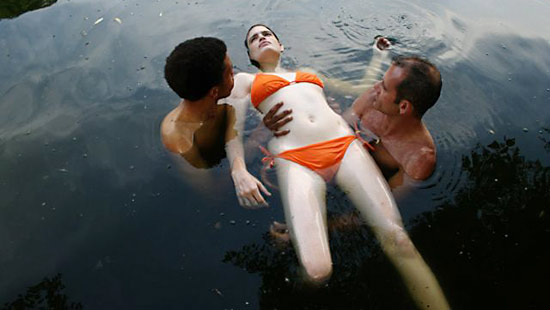 The name Rick Moody will be familiar to anyone who keeps current with American writing. He’s the recipient of several awards and fellowships, including the Pushcart Prize, a Guggenheim fellowship and the PEN/Martha Albrand Award for the Art of the Memoir, and his lauded 1994 novel The Ice Storm was filmed by director Ang Lee. Moody is hanging around the MAGNET shop this week mostly because of his side job as one-quarter of the Wingdale Community Singers, a remarkable collection of writers, musicians and artists of varying stripes. Once pegged as an “urban folk” group that wrote old-timey songs about modern topics such as cross-dressers and funky Brooklyn culture, the Wingdales just released their second album, Spirit Duplicator, on the Scarlet Shame label. In addition to his writing and recording projects, Moody is guest editing magnetmagazine.com this week. Read our Q&A with him.
The name Rick Moody will be familiar to anyone who keeps current with American writing. He’s the recipient of several awards and fellowships, including the Pushcart Prize, a Guggenheim fellowship and the PEN/Martha Albrand Award for the Art of the Memoir, and his lauded 1994 novel The Ice Storm was filmed by director Ang Lee. Moody is hanging around the MAGNET shop this week mostly because of his side job as one-quarter of the Wingdale Community Singers, a remarkable collection of writers, musicians and artists of varying stripes. Once pegged as an “urban folk” group that wrote old-timey songs about modern topics such as cross-dressers and funky Brooklyn culture, the Wingdales just released their second album, Spirit Duplicator, on the Scarlet Shame label. In addition to his writing and recording projects, Moody is guest editing magnetmagazine.com this week. Read our Q&A with him.
 Moody: Cinema in the U.S. of A. is dead, and it’s dead because the multinational entertainment providers want it that way. As a result, the given-up-for-dead medium of television is where all the action is these days, at least if you are not 10 years old and think that Pixar is the ne plus ultra of creativity. Many filmmakers of merit, therefore, are going the art route, by which I mean the gallery and museum route, and Laurel Nakadate is one such example. I think she got her start at Yale in the graduate program in fine arts, where she was a photographer. Her earlier videos are arresting, and organized around ritual and silence and around subjects who are in exile from the cinematic lens, people who look like people, and who behave like people, not like celebutantes from Beverly Hills. The film I’m plugging here is hard to see—you can’t get hold of a copy easily—but Stay The Same Never Change is more than worth the effort. The results, in terms of love for the neglected, and voice to the voiceless, distantly recalls Korine’s Gummo, but with less violence and less cynicism, or perhaps Miranda July’s shorter works, for attention to the surrealism of private ritual. When one of the teenage female protagonists here makes her own boyfriend doll and lies down with him, it’s more illuminating of the postmodern now than anything we’ve seen on a screen in years. Video after the jump.
Moody: Cinema in the U.S. of A. is dead, and it’s dead because the multinational entertainment providers want it that way. As a result, the given-up-for-dead medium of television is where all the action is these days, at least if you are not 10 years old and think that Pixar is the ne plus ultra of creativity. Many filmmakers of merit, therefore, are going the art route, by which I mean the gallery and museum route, and Laurel Nakadate is one such example. I think she got her start at Yale in the graduate program in fine arts, where she was a photographer. Her earlier videos are arresting, and organized around ritual and silence and around subjects who are in exile from the cinematic lens, people who look like people, and who behave like people, not like celebutantes from Beverly Hills. The film I’m plugging here is hard to see—you can’t get hold of a copy easily—but Stay The Same Never Change is more than worth the effort. The results, in terms of love for the neglected, and voice to the voiceless, distantly recalls Korine’s Gummo, but with less violence and less cynicism, or perhaps Miranda July’s shorter works, for attention to the surrealism of private ritual. When one of the teenage female protagonists here makes her own boyfriend doll and lies down with him, it’s more illuminating of the postmodern now than anything we’ve seen on a screen in years. Video after the jump.






